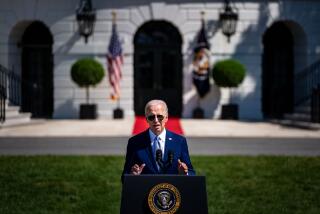Senate Panel Had OKd Plan : House Committee Rejects 8-Cent Cigarette Tax Hike
- Share via
WASHINGTON — The Senate Finance Committee, searching for ways to help Congress meet its deficit-reduction targets, voted Wednesday to raise the federal cigarette tax by 8 cents a pack.
But a House panel strongly rejected the proposal.
The votes occurred as the full Senate took up an amendment to again make spending cuts automatic under the Gramm-Rudman budget-balancing law. The Supreme Court had ruled the spending cut mechanism unconstitutional.
The Finance Committee, by an 11-8 vote, approved raising the cigarette tax on Oct. 1 to 24 cents from the current 16 cents. That would raise $5 billion for the Treasury over the next three years, Sen. John H. Chafee (R-R.I.), sponsor of the amendment, said.
Chafee’s amendment was a substitute for a proposal to increase the federal excise tax on telephone service.
“Telephones are a true necessity,” Sen. John C. Danforth (R-Mo.) said. “Cigarette smoking is not.”
Committee Chairman Bob Packwood (R-Ore.) opposed the tax hike, saying afterward that he did not want to hit the tobacco industry twice in one year. In April, the current tax was extended, instead of being allowed to drop back to 8 cents a pack, as scheduled.
Sen. James T. Broyhill (R-N.C.) said he and Sen. Jesse Helms (R-N.C.) were gearing up to fight the proposal. Helms had supported the tax extension because it was tied to a new subsidy program for the tobacco industry.
Meanwhile, apparently spurred by the Senate committee’s action, the House Ways and Means Committee took up a similar provision proposed by Rep. Andrew Jacobs Jr. (D-Ind.). But the measure went down to defeat, 28 to 4.
Committee members argued that raising the tax unfairly singled out the tobacco industry and working people who smoke.
The House committee voted to continue the telephone excise tax at its current 3% rate.
The Senate committee had approved the cigarette tax hike as part of a $14.1-billion package designed to help cut deficits over the next three years. The taxes and spending cuts would help Congress meet the Gramm-Rudman law’s fiscal 1987 deficit target of $144 billion.
The Supreme Court ruled the main enforcement provision of Gramm-Rudman unconstitutional because it gave an officer of Congress the power to order the executive branch to make spending cuts.
More to Read
Get the L.A. Times Politics newsletter
Deeply reported insights into legislation, politics and policy from Sacramento, Washington and beyond. In your inbox twice per week.
You may occasionally receive promotional content from the Los Angeles Times.









